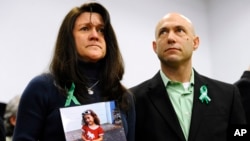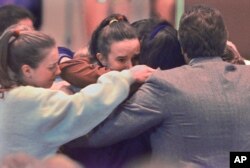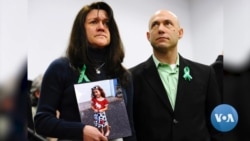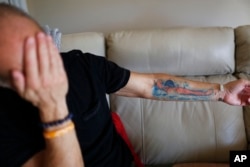The recent suicides of three people connected to school shootings have drawn attention to the other victims of mass attacks — people who survive the initial traumatic experience only to take their own lives later.
“The pain is grinding, and it feels like it’s never going to stop,” says retired teacher Paula Reed, who survived the 1999 massacre at Columbine High School that left 13 dead and more than 20 injured.
Reed struggled with PTSD and says she was suicidal by the three-year anniversary of the shooting at her school.
“I never ever in my life struggled with anxiety or PTSD or depression or anything like that,” Reed says. “So having been through the worst of PTSD I have an understanding of people with clinical depression that I never had before, and because I still get anxiety attacks, I definitely have an understanding of that. That is something that never happened to me before that happens now.”
More than a quarter of mass shooting survivors develop post-traumatic stress disorder, according to the National Center for PTSD at the at the U.S. Department of Veterans Affairs.
Symptoms of PTSD can include agitation, hostility, hypervigilance, self-destructive behavior, social isolation, insomnia, nightmares, emotional detachment and unwanted thoughts. PTSD has been linked to suicide.
In the 20 years since Columbine, about 223,000 U.S. students have been exposed to gun violence at 229 schools nationwide, according to The Washington Post.
“Children are very resilient, and they can come back, and they can deal with problems, and they can cope,” says Dr. Donald Freedheim, a psychologist who has worked with trauma survivors.
He says people who have suicidal thoughts after a school shooting are sometimes reacting to a previous negative experience. A new trauma like a school shooting can stir up all of the feelings, misery and depression of that earlier trauma.
WATCH: Dora's video report from Colorado
Jeremy Richman, a father who lost his first-grader at Sandy Hook Elementary, killed himself this past March, years after his daughter was murdered, and just days after two student survivors of the Marjory Stoneman Douglas High School shooting in Parkland, Florida took their own lives.
Seventeen people were killed in the Parkland attack on Valentine’s Day 2018. Twenty first-graders and four educators were killed at the Newtown, Connecticut, elementary school on December 14, 2012.
“Time heals everything but one thing,” says Freedheim, “and that is the loss of a child. Time never heals that. It’s contrary to nature’s way…It leaves a scar that never completely heals.”
Two members of the Columbine community — a star student athlete and the mother of a student who was paralyzed in the school attack — also committed suicide after the 1999 mass shooting.
Samantha Haviland, who survived the Columbine massacre and is now director of counseling for Denver Public Schools, says it is hard to come to terms with the enormity of the loss on multiple levels.
“These shooting events, they rip apart almost every piece of your identity. They aim for that, right?” she says. “So these parents, their children have been taken away from them in an environment where they were supposed to be. And then you lose your community, and you lose so much of what we like about our world gets lost.”
Haviland urges survivors, including those who lose friends and loved ones in attacks, to seek mental health counseling just as she did, because the number of victims connected to a mass shooting goes well beyond the official body count.










